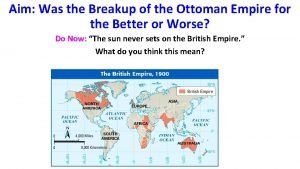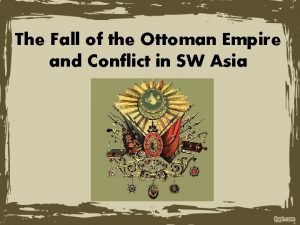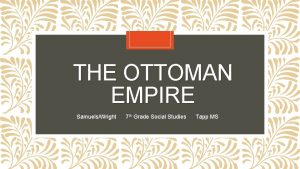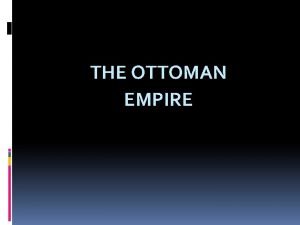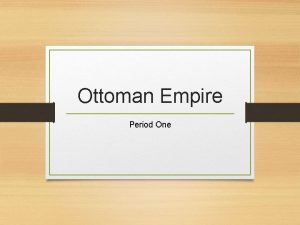The Ottoman Empire I Ottoman Empire 1 Loyal




- Slides: 4

The Ottoman Empire I. Ottoman Empire 1. Loyal subjects of the Turks 2. Turks gave them Asia Minor 3. Gained control of Constantinople a. Byzantine Empire’s Capital 4. Built a Strong Loyal Army a. Janissary Corps. -Christian slaves

I. Ottoman Empire continued… 5. Muhammad II (1451 -1481) a. Captured Constantinople -renamed it Istanbul (Turkey) b. Founded the Ottoman Empire

II. Fall of the Ottoman Empire 1. Suleiman I “The Magnificent” (1520 -1566) 2. Over-ran Hungary (1526) a. Europe feared him 3. Captured: a. Rhodes (1550) b. Tripoli

II. Fall of the Ottoman Empire continued… www. historyplace. com/. . . /genocide/armenians. htm 4. Spread Islam 5. Reformed laws -Nickname: “The Law-giver” 6. When he died: -Ottomans forced out of Europe Empire based around the Turkish sultan, lasting from 1300 until 1922, and covering at its peak (1683 - 99) an area including today's Hungary, Yugoslavia, Croatia, Bosnia, Albania, Macedonia, Greece, Romania, Moldova, Bulgaria, southern Ukraine, Turkey, Georgia, Armenia Iraq, Kuwait, Cyprus, Syria, Lebanon, Israel, Palestine, Jordan, eastern and western Saudi Arabia, Oman, Bahrain, eastern Yemen, Egypt, northern Libya, Tunisia, and northern Algeria. The Ottoman Empire was not a Turkish empire as such, since Turks did not profit more from the benefits of the state than the peoples in non-Turkish territories. And even though the first sultans were Turkish, they generally married non. Turkish women, so the race of later sultans was not Turkish either. The empire was through most of its period not a state in the modern sense of the word, but more of a military administration. While the Ottoman Empire at its death bed had few friends, it still had offered its inhabitants many benefits through most of its existence. For Muslims it was considered as a defence against the non-Muslim world. For non-Muslims it offered a better life and more security than Christian states up until the 18 th century. For most of its inhabitants it had offered career possibilities. And it offered peace and relative harmony to all its inhabitants despite cultural and ethnic differences. www. 24 april 1915. com/eng/resources_downloads. html
